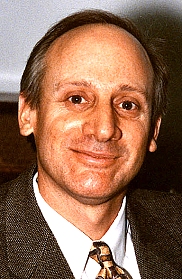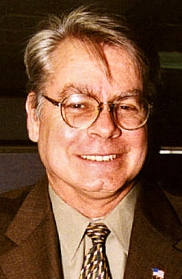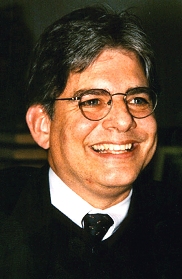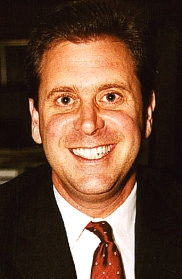
PAUL
A.
BACIGALUPO

DAVID
CRAWFORD III

STEVEN
LUBELL

DAVID
GELFOUND
Wednesday, February 27, 2002
Page 5
Los Angeles Superior Court Office No. 67
Commissioner, Trial Lawyer, State Bar Judge, Prosecutor Square Off
|
|
|
|
|
|
By ROBERT GREENE, Staff Writer
Los Angeles Superior Court commissioners may be among the people most ready to become Superior Court judges given the fact that they already wear the robe, sit on the bench, preside over the cases, and make the decisions.
Hired by the court’s judges rather than elected by the people or appointed by the governor, commissioners have jurisdiction to perform lesser courtroom tasks but take on the role of judges upon stipulation by the parties.
On the bench, they are addressed as “your honor,” or even as “judge.”
But being a Superior Court commissioner has never been a ticket to success at the polls, at least not in recent Los Angeles judicial races.
That must be a sobering fact for Steven Lubell, a commissioner sitting on the Superior Court bench in Glendale.
LACBA Ratings
Of the four candidates in the Office No. 67 race on the March 5 ballot, only Lubell and State Bar Court Judge Paul Bacigalupo were rated “well qualified” by the Los Angeles County Bar Assn. to become Superior Court judges. Prosecutor David Gelfound and private practitioner David Crawford were both rated “qualified.”
The Los Angeles Times, in its judicial endorsements published a week ago, backed Bacigalupo, citing his “strong background in civil law and a ‘well qualified’ rating from the bar.”
Bacigalupo also is a bench officer, hearing discipline cases brought by the State Bar against lawyers and presiding over a courtroom in which the professional stakes are high and hearings can be tense.
But having put great stock in the County Bar’s rating for Bacigalupo, the Times gave a passing nod to Gelfound, “a talented deputy district attorney who may one day become a judge.” There was no mention of Lubell, who received a higher rating than Gelfound.
“A lot of people don’t understand what the role of commissioner is,” Lubell acknowledges.
The 46-year-old commissioner is fighting an uphill battle in the March 5 race to win a place in a November runoff, if there is one. Crawford has shown some fundraising prowess, but Lubell names as his toughest opponents Gelfound, with his criminal prosecutor ballot designation, and Bacigalupo, with his candidate statement that repeatedly refers to the State Bar Court supervising judge as “Judge Bacigalupo.”
“There is going to be a runoff, and I can go at least $100,000,” Lubell says. “But I would rather save my final dollars for the runoff election. My goal is to get through the primary.”
This is not Lubell’s first foray into judicial politics. He ran for the Glendale Municipal Court in 1994 to succeed James Rogan, but finished in the pack as James Simpson was elected in a winner-take-all election.
Lubell was born in New York but grew up in Beverly Hills, graduating from Beverly Hills High School in 1973.
Veterinary Medicine
He at first wanted to go into veterinary medicine, but took some criminology classes and became interested in the justice system. On graduating from Cal State Los Angeles in 1977, he was hired by the Los Angeles Police Department and entered the Police Academy.
He left after less than a week.
“I wasn’t quite ready to do that,” he explains.
Instead, he went to work as a controller for the father of a friend of his in a leasing business that handled aircraft as well as cars. Working on repossessions and preparing documents for litigation by day, he entered the University of West Los Angeles School of Law and took classes by night.
“That’s when the law bug really bit me,” he says.
He was admitted to the bar in 1986, set up a practice with an acquaintance, and began serving in the Glendale and Burbank municipal courts as a judge pro tem.
Meanwhile, he served as an adjunct law professor at San Fernando Valley College of Law—a position that once earned him and awarded as the school’s “law professor of the year.”
Several years after Lubell lost the open seat race in Glendale, Simpson—the man who defeated him—joined with the other judges in hiring him as a commissioner of the Glendale Municipal Court. Lubell became a Superior Court commissioner on unification in 2000.
Simpson, who was also elevated to the Superior Court due to unification, later took disability retirement after the Commission on Judicial Performance charged that he tried to intervene with Glendale court commissioners, including Lubell, on behalf of friends who had gotten traffic tickets.
Lubell says he loves his work as a Superior Court bench officer, even though he makes less money than he did as a private practitioner.
“I have enjoyed it,” he says. “I got a good response from the community.”
That sentiment is echoed by attorney Robert Holmes of the Glendale firm of Holmes & Holmes. Holmes practiced in front of Lubell, before the commissioner was moved to a criminal calendar, and says he was impressed with Lubell’s demeanor.
“He’s extremely courteous and professional, especially with pro pers,” Holmes says.
Like Lubell, Holmes served in Glendale as a judge pro tem. As an attorney and as a volunteer bench officer, he says, he began to hear “about this guy who was so professional in the way he ran his courtroom.”
Lubell’s former supervising judge, Carl West, calls him “a model bench officer.” West also notes that with Simpson off the bench and other vacancies in Glendale, Lubell has at times handled multiple calendars.
Under such circumstances, West says, even the most seasoned bench officer can sometimes appear a little short when handling cases. West notes that Deputy County Counsel James Hill, who appeared as a client in a private matter in front of Lubell, complained about Lubell’s handling of his matter. Hill wrote a letter to the MetNews saying Lubell should be ousted along with Simpson as part of a “housecleaning.”
But West says he listened to the tapes of the proceedings and found Lubell conducted himself with “an utmost respect for the parties.”
Lubell applied to Gov. Gray Davis for a judgeship almost two years ago, but never heard anything, so he filed for the open seat.
Early on in the race, he said he planned to do much of his campaigning by advertising in community newspapers. But he has raised only about $4,600, according to campaign finance reports, and has spent only a few hundred dollars, most of it on mailing, copying and office supplies.
Encouraged to Run
Gelfound, 38, says he has not bothered to apply to Davis for a judgeship because he is a Republican. He was encouraged to run for the post by Richard Stone Jr., his former colleague in the District Attorney’s Office who ran for and was elected to the bench two years ago.
“I like to see good people on the bench, and I know Dave Gelfound will make a great judge,” Stone explains.
Gelfound is one of the six candidates for the seven Superior Court seats who have retained the services of political consultant Fred Huebscher.
“He seems to know the business well,” Gelfound says of Huebscher, who helped Stone get elected. “He has a good success rate.”
But Gelfound has done quite a bit on his own, securing more than $50,000—most of it in loans—to make sure his name appears on slate mailers going out to the more than four million county voters. He says he also wants to make sure voters know about the more than 40 sitting Superior Court judges who have endorsed him, along with a host of law enforcement agencies, such as the Association of Los Angeles Deputy Sheriffs and the Los Angeles County Professional Peace Officers’ Association.
Gelfound also has acquired the backing of county Supervisor Mike Antonovich and District Attorney Steve Cooley.
“My impression is that three of the candidates are very good,” Cooley explains. “But I know David’s work as a deputy D.A. It is important to let the public know when there is a good candidate. There has to be some recognition that it’s your own people in the race and that they will make good judges.”
Gelfound says the County Bar denied him its top rating because of a perceived lack in his breadth of experience.
But unlike most prosecutors who run for the bench, the Simi Valley resident can boast of private sector experience.
Construction Defense
After graduating from Pepperdine University School of Law in 1989, Gelfound went to work for Oskar Stark, a San Fernando Valley lawyer who was looking for a young lawyer to help him in his practice. Stark became, in Gelfound’s words, a mentor, and the two men worked together on construction defense matters.
In the early 1990s, when Stark’s health failed, Gelfound took on more and more of the work.
“I was not going to bail on the guy,” he explains.
Gelfound ultimately handled the sale of the practice and worked for another year at the successor firm. He then served another year at Mischel, Trock, & Associates, handling insurance defense and construction litigation.
He joined the District Attorney’s Office in 1994, starting with misdemeanor assignments in Newhall, then worked in juvenile delinquency in Pasadena, felony trials in Van Nuys, and the hardcore gang division in San Fernando.
In July 2000, he was transferred to the hardcore gang division downtown and prosecuted gang-related murders. He presently works with the LAPD in the Northeast Division in gang prosecutions.
“Generally, prosecutors make good judges,” Gelfound says. “There is good training and unbelievable experience.”
He believed his experience prosecuting gang crimes warranted a ballot designation of “Gang Prosecutor,” but the county registrar/recorder disagreed, so Gelfound settled for “Criminal Prosecutor”—a designation that he says is almost as good and will win him votes.
But while he did not believe that his first choice of a ballot designation was worth going to court for, Gelfound did spur a challenge to Bacigalupo’s designation as “Judge, State Bar.”
Gelfound did not bring the action himself, but he acknowledges conferring on the matter with the petitioner, attorney Ben Davidian, who represented a voter contending that Bacigalupo’s designation would mislead voters into thinking he was already a Superior Court judge.
Davidian argued that Bacigalupo is a “hearing judge,” not just a “judge.” But Los Angeles Superior Court Judge David Yaffe ruled that the title was appropriate, given the law limiting designations for non-incumbents to three words.
Gelfound says he believes the challenge was proper and notes that Bacigalupo’s designation could give the State Bar Court judge an edge on election day. But he adds that the two men will almost certainly wind up in a runoff, at which point the outcome could be anyone’s guess.
Unlike Bacigalupo, Gelfound opted against paying the more than $26,000 it costs to place a candidate statement in the official ballot. The money is better spent elsewhere, he says. If Bacigalupo comes out ahead, it will be because of his “Judge, State Bar” title, Gelfound remarks.
Still, Gelfound admits, he could be wrong.
“His [Bacigalupo’s] ballot statement may crush me, and so be it,” Gelfound says.
Dark Horse
Crawford, 46, is somewhat of a dark horse in the race, without the bench experience of Lubell or Bacigalupo or the snappy ballot designation that Gelfound and Bacigalupo each have.
Cooley, pressed for an explanation of his comment that there are three candidates in the race that would make good judges, lets it be known that Crawford was his odd man out.
But Crawford says he will not let the other candidates come between him and his lifelong ambition to serve as a judge.
“It seems to me that as far back as I can remember that’s what I shot for,” Crawford says. “I’ve always known I wanted to be a judge. But things would come up, and I never did it.”
Now, Crawford says, it is time.
To achieve his goal, he is buying space on the slate mailers that are expected to begin arriving in voters’ mailboxes toward the end of this week. He acknowledges that as a “Trial Attorney” he has perhaps the least amount of ballot cachet, but he is banking on the hope that Bacigalupo, Gelfound and Lubell will cancel each other out.
“I’m going to give it a try,” Crawford says, adding hopefully:
“I was the first one who signed up for the office.”
Crawford was born in North Carolina, the son of a military man stationed at Fort Bragg. The family moved to Monterey and Sacramento, and Crawford graduated from high school in Las Vegas and attended the University of Nevada-Las Vegas. That made him the first in his family to attend college.
Nevada had no law schoolat the time so Crawford went to Pepperdine.
After graduating in 1980, he had trouble finding work, especially given an unsuccessful streak with the Bar Exam.
He became a member of the State Bar in 1985. Eventually he went to work for a sole practitioner.
“When I graduated from law school, I just kind of fell into insurance defense work,” Crawford says, and has been in the field ever since.
His resume lists a string of jobs at firms that handle insurance defense for a variety of insurers. He was at first with Mommarts & Rutledge, representing Farmers Insurance, then the law office of Nolan Henderson, in-house counsel for Safeco insurance Co. He had his own firm for two years in the early 1990s, doing arbitrations and handling several jury trials while serving as a court-appointed judge pro tem.
Then he went to Richardson, Bambrick, Cermak & Bennett as in-house defense counsel for the Automobile Club of Southern California. After a year and a half, it was on to Prestholt & Fidone, where he had his longest tenure, working for six years on seven Superior Court and five municipal court trials.
In 2001, he went to Pollard, Harrell & Googooian as in-house defense counsel for Zurich North America insurance Co.
That’s where he is today.
Crawford is one of a handful of candidates who have posted a website. The exposure will help, he says, although he acknowledges it works only for people who are looking for it or stumble across it by chance.
If the counter posted at the bottom of the site is accurate, it’s not working so far. It shows 205 visits.
The site, www.dcIII.com, includes a statement of Crawford’s objectives.
“I want to be sure that all who encounter the justice system have a full understanding of its process and purpose,” he says. “I want their experience with the justice system to be meaningful and positive even when it does not move in their favor. I want each individual to feel that the system is designed to resolve differences in an unbiased and user-friendly manner.”
‘Important Friends’
Bacigalupo, 42, says he has “been fortunate enough to have a number of important friends.”
That’s putting it mildly. The State Bar Court supervising judge has garnered the endorsements of a host of people who rarely endorse in judicial races, including Mayor James Hahn, City Attorney Rocky Delgadillo, county Supervisor Don Knabe and former Assembly Speaker Robert Hertzberg. Sheriff Lee Baca is on the list too, and while he has been known to endorse in judicial races, he usually backs prosecutors.
Bacigalupo is an award-winning mediator and has broad experience in civil and administrative practice, having worked in immigration law, civil litigation and construction defense.
But he also benefits from the large rolodex provided by his wife, political fundraiser Lucy McCoy Bacigalupo.
Lucy McCoy, as she is widely known in political circles, had her own successful Valley-based fundraising firm and was closely associated with the rise of Los Angeles Mayor Richard Riordan. Riordan appointed her to the city’s Library Commission and, eventually, to lead the city’s fundraising effort for the 2000 Democratic National Convention.
But the then-mayor later ousted McCoy from the job. She later left the Library Commission as well, but was reappointed by the new mayor, James Hahn.
Meanwhile, McCoy launched a new firm, Garcia-McCoy-Lee, with two others who were once in the Riordan camp—Dan Garcia and Mee Lee. The firm does real estate consulting as well as fundraising.
It is now entering campaign consulting. Garcia-McCoy-Lee is running the Bacigalupo-for-Judge campaign.
Bacigalupo says he can be distinguished from the rest of the pack in his four-man race by his judicial experience. No less than Lubell, he says, he presides over a calendar of trials and does his best to encourage settlements. Failing that, he says he runs a disciplined courtroom and gives all sides an opportunity to present their cases.
“I’m not an at-will employee,” he remarks, referring again to Lubell. “I’m the supervising judge of this court [the three-judge State Bar panel in Los Angeles]. I supervise my judicial colleagues and am responsible for them. That is a significant position.”
He also serves on assignment to the State Bar’s Review Department, the appellate body for the lawyers’ discipline system.
Hertzberg Appointee
Bacigalupo was appointed to the State Bar Court by Hertzberg following the near melt-down of the attorney discipline system due to a funding crisis. The Supreme Court held over several Bar Court judges during the period of confusion, leaving them to re-stagger the terms once funding was again available.
That left Bacigalupo with an abbreviated two-year term that expires in November of this year.
But by then, Bacigalupo says, he is hoping to be well on his way to a Superior Court judgeship.
“I’m seeking this because I believe I can play an important part in improving the quality of the administration of justice,” Bacigalupo says.
Attorney Diane Karpman, an expert in attorney discipline matters, praises Bacigalupo for being “a really nice man”—then hastily adds that the comment is not as goofy as it may sound.
“Demeanor is so important in the State Bar Court,” Karpman says. “There’s nothing but lawyers there, and the amount of wordsmithing that goes on can get very intense. He has a cool and subtle demeanor. I would think that can be very useful in the civil courts as well, especially in a case where there are pro pers. He has a certain way about him that is particularly appealing.”
The State Bar Court staff, too, finds a lot to like about the supervising judge.
“He works very hard, is very diligent and fair,” court administrator Scott Drexel says.
Bacigalupo grew up in Visalia, attended college in Santa Clara and earned his law degree from McGeorge School of Law in Sacramento.
He then served as a judicial clerk for the U.S. Immigration Court on Los Angeles street downtown, working with nine administrative law judges.
His practice has been varied. Bacigalupo has never stayed out in one position for more than a few years.
After his term on the Immigration Court was completed, he went into immigration law practice, then moved to a Westside firm where he practiced construction defense law and got experience as a litigator. That practice took him around the state quite a bit, mostly to San Diego in a series of matters stemming from leaky piping.
He then moved to a firm that was, in essence, in-house defense counsel for ITT Hartford insurance. Meanwhile, he became a director of Dispute Resolution Services and was named the organization’s family mediator of the year.
He later associated with JAMS/Endispute—the youngest private judge in the nationwide firm. Two years later, he left to establish his own firm, was there just under three years, and then joined the Century City firm of Castle & Lax.
Then came the Hertzberg appointment to the State Bar Court.
Candidate Statement
Bacigalupo is one of only two candidates among the 21 who are running for seven judicial posts to pay the money needed for a candidate statement. The statement notes that Bacigalupo “administers attorney discipline for the California Supreme Court” with the last three words in bold print.
It may seem like a stretch, but the discipline system is indeed under the oversight of the state high court.
The statement also includes the words, four times, in bold print, the words “Judge Paul Bacigalupo.”
That may not sit well with Gelfound, who supported the challenge to the ballot designation and can’t be to pleased with the candidate statement.
But Bacigalupo serves in the post and paid the money for the statement. It will be enough, he says, to assure him of a spot in the runoff—at least.
Copyright 2002, Metropolitan News Company